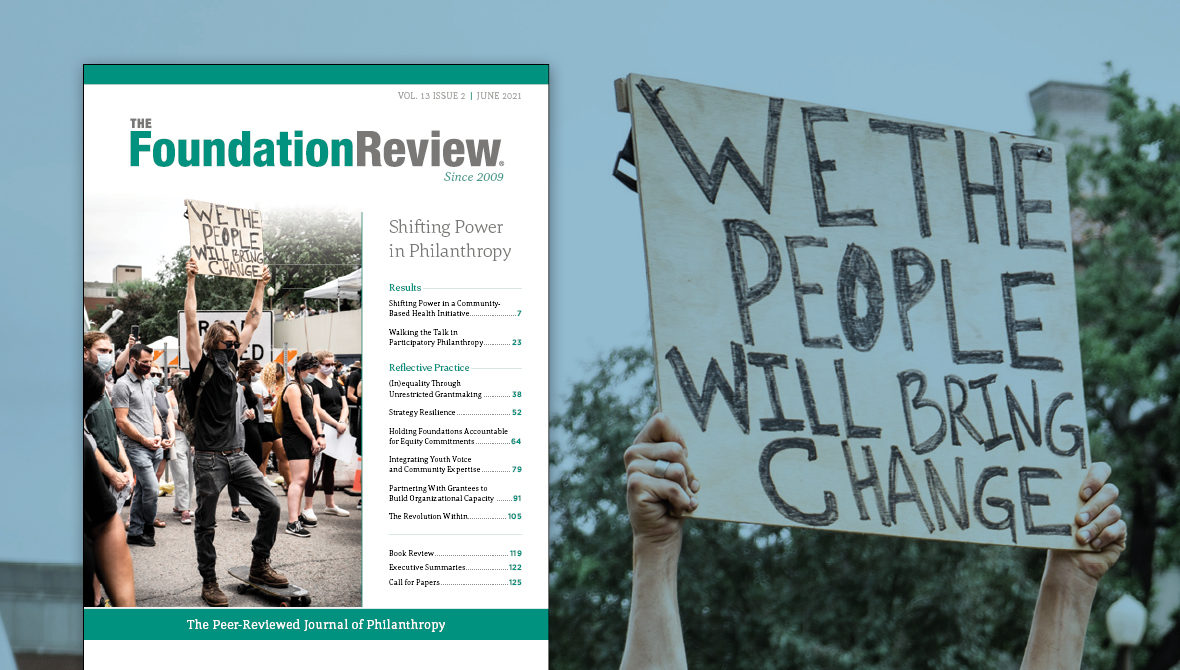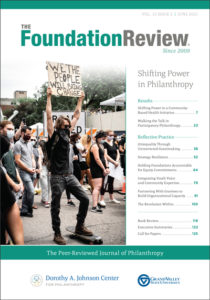Shifting Power in Philanthropy


 Themes for issues of The Foundation Review often arise from our observation of what we see happening in the field or the interests of sponsors. Appropriately, the genesis for this issue on shifting power in philanthropy was bottom-up — we received several submissions for open (unthemed) issues that were related to how philanthropy is engaging more and differently with communities and thought it warranted a focused issue.
Themes for issues of The Foundation Review often arise from our observation of what we see happening in the field or the interests of sponsors. Appropriately, the genesis for this issue on shifting power in philanthropy was bottom-up — we received several submissions for open (unthemed) issues that were related to how philanthropy is engaging more and differently with communities and thought it warranted a focused issue.
Over the past eighteen months, the deep racial disparities in everything from access to basic needs (food, housing), to policing practices, to the ability to work and learn remotely, were laid bare. While many foundations had already begun re-examining how they could center equity in their work, this internal work has accelerated and the external scrutiny of the sector has ramped up. Demands for greater transparency, increased distribution of funds, and broader participation in decision-making about where money goes have increased.
Each of these articles in volume 13, issue 2 provides a view on what it means to shift power and what it takes to do it. They define power-shifting differently, focusing on varying levels of decision-making and various aspects of the whole change-making enterprise. Fundamentally, all aspects of a foundation will need to change in order to truly share power — it has to be embedded in everything from strategy to proposal review to evaluation processes. These articles offer some insights into how to begin this journey.
Foster, Doksum, and Dwyer share the results of an evaluation of the Maine Health Access Foundation’s place-based funding to communities to address systems issues that impede access to essential services and supports. The evaluation and learning process spanned five of six years of the initiative and generally found that partnerships contribute to effective systems change and that community-generated ideas spark innovative interventions. They adopted changes in practice like including those affected by systems problems to participate in the grant review process and offering longer-term, general operating support grants.
“Participatory grantmaking” has entered the lexicon and toolkit for grantmakers. Meyer, Goering, Hopkins, Hyde, Mattocks, and Denlinger examine the participatory grantmaking process of a Baltimore, Maryland, community foundation that invested $1.5 million in an initiative to support community-building and improvement activities in two communities. Deep trust and an understanding of the history and politics among community members are identified as critical to success.
While multi-year general operating support has been identified as one way to share power with grantees, Hunnik, de Wit, and Wiepking share insights into how unrestricted grantmaking influences the relationship between funders and grantees. Hidden and invisible power dynamics exist in the relationship, even when there are few formal restrictions on grantees’ spending. Relaxing formal restrictions gives rise to some uncertainty about what grantees actually have to “prove” to get or maintain funding.
Lynn, Nolan, and Waring argue that developing resilient strategies that can withstand shocks like a pandemic is critical; sharing power to develop and adapt strategy is key to developing resilient strategies. They argue that strategy resilience centers people and organizations instead of the power of financial resources. At the core of this theory is the assumption that given today’s complexities, philanthropy must use its power differently — releasing control over organizations and their change strategies while using its unique position, reach, and voice to work in solidarity with community leaders.
While much attention is paid to decision-making about awarding funding, Beer, Patrizi, and Coffman examine how foundation strategy, evaluation, grantee reporting, and monitoring processes have allowed foundations to retain their power and sidestep direct accountability to the people and communities they say they want to serve. They argue that substantial shifts in decision-making power and how foundations act in relation to others are needed if funders are to be held to their commitments to equity and justice.
Stakeholder engagement in identifying what needs to be changed is probably the most basic first step in power-shifting. Yonas, Sloan, Hollis, Sizemore, Elliott, McMurray, and Pearlman describe how discussion groups empowered young people to reflect on events that impacted their lives. Recommendations on school discipline reforms, greater access to diversion and prevention programs, and changes to court-related fees, fines, and restitution policies informed the foundation’s grantmaking.
Dymnicki, Hooker, and Goldberg reflect on the S. D. Bechtel, Jr. Foundation’s National Character Initiative to support organizations seeking to advance character development among youth. In order to shift the grantor-grantee power dynamic, the initiative focused on building grantee capacity, based on grantee priorities.
Ricci, Csuti, and Ramirez follow up on an article in The Foundation Review, published in October 2016, that described a new vision for grantmaking at The Colorado Trust that shifted power from the foundation to community residents. Based on learning from the first five years, The Trust is pivoting to a new approach based on community organizing. The focus will be on building community capacity, rather than individual organizational capacity.
Explore the full issue here. Not yet a subscriber? Click here to start your free 90-day trial.